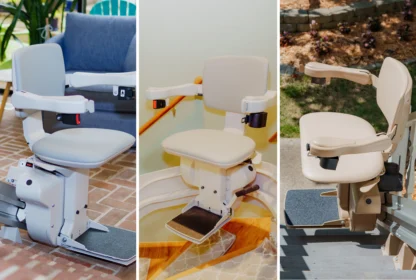
Mom and Dad are moving in. Time to celebrate — or panic?!
Whether the reason is advancing Alzheimer’s, decreased mobility, vision loss — or if it’s just to be closer to the grandkids and save on monthly bills — there are some things you should know before the big transition.
Consider these tips and resources for surviving a full nest and the inevitable role reversal conflicts that come along with having your or a spouse’s parent(s) move in:
Prepare the home. Even if they will have their own private entrance and living quarters, do a walk-through of the space to determine areas that may need to be modified for safety or efficiency. It’s best to do this walk-through together in order to prevent installing a stair lift that your mother-in-law never plans on using, or offending Dad by putting up grab bars in the bathroom. They may need both of these features, and they may find them helpful, but include your parent(s) in the decision-making process to avoid unnecessary conflict or resentment. Several articles on our blog are applicable here:
- Tips for Supporting Aging in Place
- How to Pay for Home Modifications
- Home Design Features to Help You Age in Place
- Tips for Preventing Falls in Your Home
Set up house rules and boundaries. While a chore chart or curfew isn’t age-appropriate, it is your home and your new residents need to respect that. If you’re sharing the kitchen, it’s reasonable to ask for help with clean-up and food preparation, if Mom’s health permits it. When possible, try to make grocery shopping or cooking a family affair so that your parent(s) can feel involved with the family rather than dependent on the family. If Dad’s going away for the weekend to visit friends or family, ask him to let you know. A dry-erase message board in a common area for leaving notes, appointments, or schedule changes might be helpful. It’s also vital to set boundaries to protect your privacy and theirs and to prevent conflicts that could arise from spending too much time together and neglecting your own family’s needs for quality time and space. Schedule a time to reevaluate and reassess the arrangement. For married couples who are moving parents in, it’s important to be aware of difficult in-law dynamics and tensions. Be especially sensitive to your spouse’s needs in these situations, and respectful of their parent(s) even if you don’t get along.
Respect their roles as your parents. They’re living under your roof, but they’re still your parents. Don’t treat them as your children. Be sensitive to this new life stage and what that all means to them. Losing their independence by moving in with you is probably not the arrangement they prefer, despite the perks and benefits it may bring. Most parents would do anything to avoid being a burden to their children. Keep this in mind as you establish your new normal as a multigenerational household.
Celebrate the opportunities that multigenerational living offers. Despite the challenges that may lie ahead, there will be many wonderful moments too. If your children are still living at home, having Grandpa around could have a tremendously positive impact on their life (and yours too, if he’s able to drive them to soccer practice or help with math homework). Perhaps you and Mom have had your differences over the years, but living together may give you a chance to heal and resolve some of those hurts and misunderstandings. When the stress of the fuller nest gets to you, remember these joyful times and aim to create new memories together.


